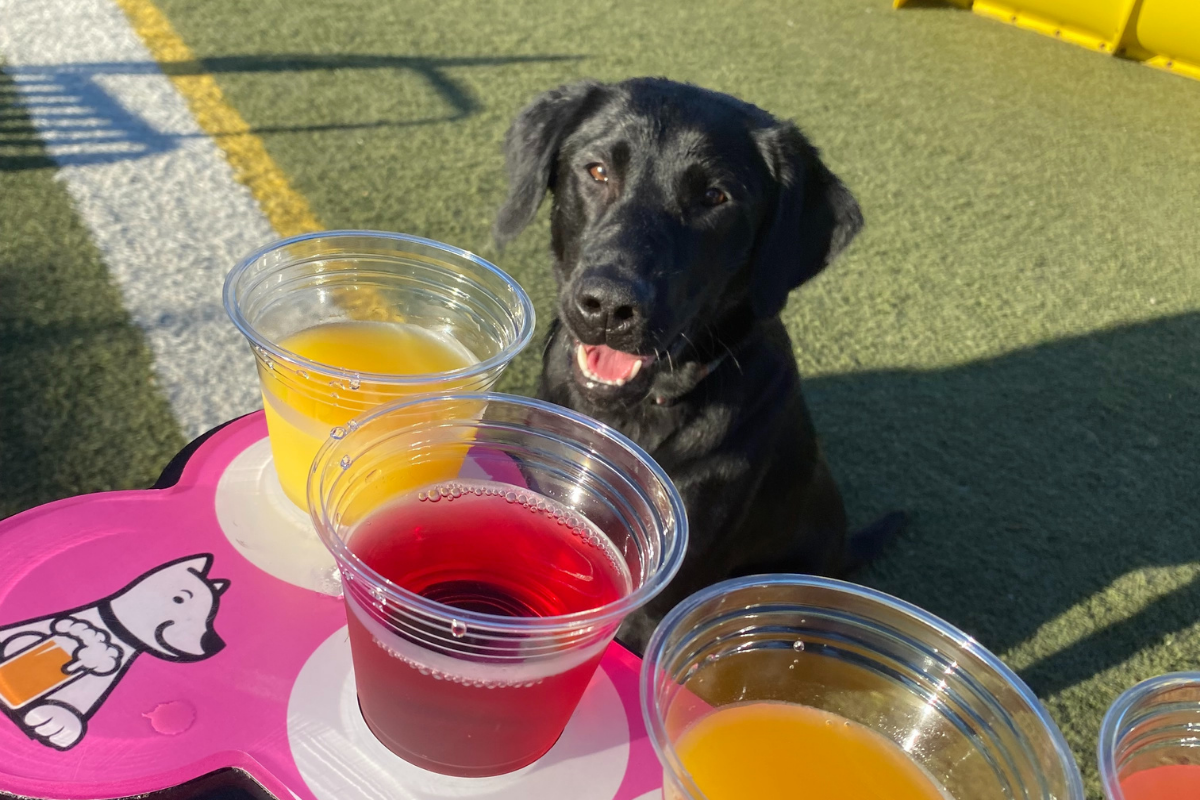by Meg McIntire
Happy hour has gone to the dogs where I live in Raleigh, N.C. Last year, three separate dog park bars, which offer fenced areas for dogs to play as well as full-service bar and café access for humans, have opened here and each one is packed every weekend.
With Raleigh’s population continuing to grow—100,000 dogs are expected to live here by 2023, according to a City of Raleigh Dog Park Study—and many of the city’s dog owners living in apartments with limited back-yard space, these dog-inclusive spaces are becoming ever more of a necessity.
And dog parents are willing to pay the price for these unique places. A monthly dog park membership at Raleigh’s West Street Dog costs $28; $40 for two dogs. It integrates an indoor off-leash dog park with a bar and also offers overnight boarding for dogs and cats. Doggos Dog Park and Pub, which has a location in Greensboro and plans to open a new location in Raleigh, charges $25 a month for the following perks: separate small dog and family/kid-friendly areas and regular dog centric community events; a full bar for humans and more than 10,000 square feet of indoor/outdoor turfed off-leash play space supervised by “Rufferees”to monitor interactions and intervene, redirect or eject dogs if necessary. But no matter if it’s a public or private place, really dog owners should be paying attention to their own dogs.
Raleigh is not alone when it comes to tapping into pet owners’ desire to give their furry family members more than a traditional public dog park experience. Membership-only dog parks are popping up in cities all over the country. From New York to Los Angeles and across the border in Canada, dog owners are looking for a safe, clean space to socialize their furry friends because they no longer think crowded, unruly public dog parks are good enough. Especially if they have shy or anxious pups.
Private dog parks require doggie background checks and offer perks like Zen rock gardens, obstacle courses,treats (for humans and dogs alike) andWi-Fi for human guests if they need to work while their pets play.
Background checks, you ask?
Almost all private dog parks require patrons to have their dogs undergo a screening process, where owners are required to show immunization forms confirming that their pet is up-to-date on all vaccines. This way, members can have peace of mind knowing all the dogs in the park are safe to play with.
The cost of private dog park membership can range from $60 to over $2,000 annually depending on the experience you’re looking for.
Members of the Warren Street DogPark in New York City pay an annual fee of $120 for the privilege of bring-ing their pup to a fenced-in, paved area that features overhangs for shade and a wading pool in the hotter months.
“There are two reasons why the Warren Street Dog Park is a ‘members only’ dog park,” notes the group’s website. “Too few people made volun-tary donations to sustain the park in terms of its financial needs (cleaning,insurance, repairs, etc.), and too many dog park users violate the rules of the park (don’t monitor their dog effec-tively, don’t pick up after their dog,bring children into the dog park, etc.).”
By enacting membership fees, the Warren Street Dog Park, like others inNew York City, has been able to ensure greater quality control over the dogs experiences than might be found in free, public spaces. But this exclusivity can also contribute to wait lists of more than a year and difficulty scheduling times to visit the park with your dog once you become a member.
Some private dog parks even offer the opportunity to have you and your dog roam acres of fenced-in forest or woodlands completely alone. CountryClub Pet Resort in Calgary, Canada, isset on 20 acres of private land that has been divided into multiple private dog parks. Each park has three to five acres of walking trails, forested areas, picnic tables and park benches and enclosed within five- to six-foot-tall fences,which allows for your dog to run safely off-leash.
Wendy Brooks, owner of CountryClub Pet Resort, explains on the resort’s website that safety and enjoyment are the two primary reasons for the surge in popularity of private parks because dogs generally thrive in familiar places with familiar faces, as opposed to situa-tions where anything can happen.
“A public off-leash park can be intimidating, or even unsafe for an anxious pet, making private dog parks the perfect solution,” she said.
Interested in starting a private dog park in your neighborhood? Check out SniffSpot.com for information on how to turn unused land into a pup playground.

